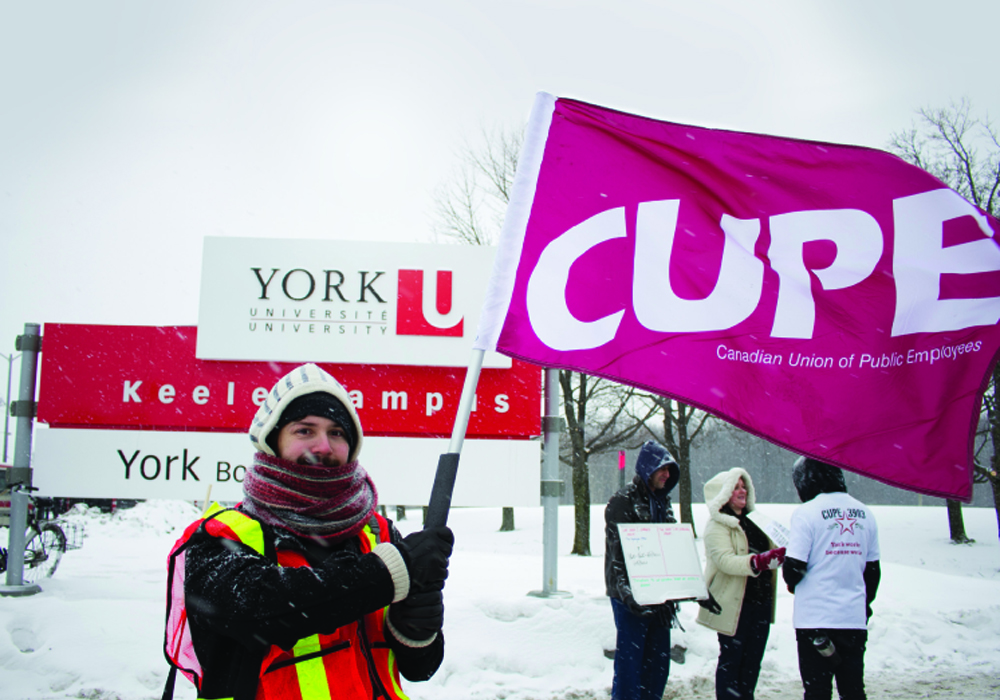The collective bargaining process between CUPE 3903 (Units 1, 2, and 3) and York continues, with both parties having met on February 27 and 28 to discuss proposals from the university on job stability and equity for Unit 2. CUPE 3903 represents York’s teaching assistants, research assistants, graduate assistants, and contract faculty.
Over the weekend of February 20, the bargaining parties met with mediator Chris Albertyn to discuss the aforementioned Unit 2 items within the bargaining unit.
According to York’s Labour Relations website, prior to the February 20 and 21 meetings with the mediator, York had presented counter proposals in response to CUPE’s proposals. The website continues to state that the university “does not anticipate providing any further response to several of CUPE’s proposals” as a result of the provincial government’s Bill 124.
When asked for an update on labour negotiations, Yanni Dagonas, York’s advisor and deputy spokesperson provided a statement on behalf of the university.
“The University is committed to working expeditiously towards reaching negotiated collective agreements with CUPE 3903 (Units 1, 2, and 3) in order to help ensure much needed stability and certainty for the York Community during these challenging and uncertain times,” the statement said.
York’s Labour Relations website also states that the university is certain their proposals of equity and job stability can be implemented and would allow for a consistent advance in diversity among party members.
While there is a full package of proposals currently available for viewing, CUPE 3903 Chairperson Maija Duncan identified two that the union considers vital priorities — hiring equity and job security.
“In terms of equity, there is clear underrepresentation of BIPOC instructors at York, especially in Unit 2, our contract faculty unit. CUPE 3903 has been trying to address this underrepresentation with joint committees and data collection for 10 years now. This approach is clearly insufficient,” she says. “There needs to be concrete steps taken to address hiring discrimination and underrepresentation.”
It’s important to note that the equity issues Duncan outlined reflect that of student leaders’ concerns in the York community as well, including the York Federation of Students and the York University Graduate Students’ Association.
The details of these steps have not yet been outlined, as it is currently something the union is discussing with Albertyn. However, Duncan stresses how important this issue is to the union, saying the union “will not recommend new contracts that don’t have something concrete on hiring equity.”
With regards to job security, Duncan mentions this has been a recurring issue in every round of the bargaining process.
“Members of CUPE 3903 do around 60 per cent of the teaching at York, yet have to reapply for their courses every year,” she says. “This is an issue of fairness to instructors, but also to students. The current hiring system often results in course directors not knowing what they will be teaching until weeks — sometimes even days — before the start of term.”
The union has several proposals they hope will increase stability for contract faculty, along with a proposal to lay out a framework for instructors who have been teaching for over 30 years to be able to retire.
As for the question on everyone’s minds — is there a possibility of a strike?
“As much as everyone wants to know the answer to this question, it is honestly impossible to tell at this point,” Duncan says.
“There are many steps that need to be taken before a strike is possible: first, there would have to be an impasse at the bargaining table, then CUPE 3903 would have to take a strike mandate vote (which is a legal requirement to make a strike possible — not a vote to actually go on strike). Then there’s conciliation, and then what’s called a no board report,” she continues. Readers interested in learning more about the lengthy process can check it out here.
For now, it seems like the union’s guess is as good as ours. However, Duncan mentions that soon things might be more clear, and she remains optimistic.
“We are still very much engaged in bargaining and have not reached an impasse that would make us consider any of the steps to get in a legal strike position. We expect to know more once we conclude the job security mediations with Albertyn,” she says.
“If these go poorly, the union will have to consider its options. Nonetheless, we are deeply committed to the bargaining process and continue to engage with the employer in working towards an agreement.”
York also stated that the next scheduled bargaining meeting has been set for March 8, and that the mediator will return again for the following weekend of March 13-14 to meet with both parties.
Read more on this from our January 12, 2021 update, March 22, 2021 update, and April 6, 2021 update.




